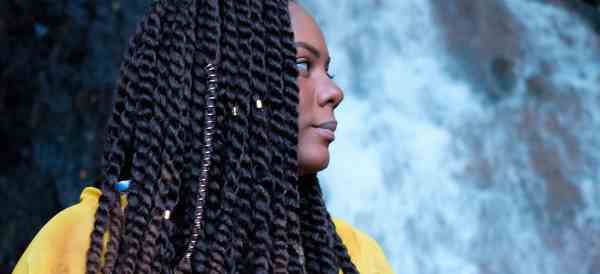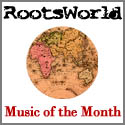

Irma Ferreira
Candomblé is Brazil’s New World iteration of African sacred practices, having evolved mostly from the Yoruba traditions of the West African countries of Nigeria and Benin. Candomblé is one of a number of such traditions practiced in the NewWorld, predominantly in the Caribbean. They include Santeria and Palo (in part) in Cuba, Vodun in Haiti, and to a lesser extent, Obeah in Jamaica. (Although much of West Africa’s cultural legacy was eradicated under slavery in the States, remnants of and allusions to it can still be found, especially in the rural South.)
Ferreira’s first solo album release, Ém Cantos de Orisá, bears the fruit of her investigation, borrowing both chants and melodies from Candomblé’s trove of devotional works. The chants have a more liturgical sound, while the songs suggest more secular themes. Pronounced percussion, typically expressive of the the more bellicose orisás, such as Sango, the spirit of thunder and lightning, and Ogúm, the warrior lord of iron and steel, yields to a more melody driven sound in Ferreira’s interpretations. The instrumentation, a blend of Western and Afro Brazilian, provides a felicitous, understated backdrop for her vocals.
"Orikí ti Sango,” Ferreira’s offering in praise of Sango, is measured, in contrast to the deity’s fierce image. Singing reverently in near a cappella, her voice is placid and comfortable, backlit by the solemn rumble of a cello.
"Olójó Oní” is languid with a penetrating melody and the same sparse instrumentation that characterizes the album. Ferriera’s bell-like voice wistfully contrasts the muted sound of the cello. The songs of Ém cantos de Orisá, sensitively and sincerely interpreted by Ms. Ferreira, are an illustrative and well-paced homage to the African retentions that have survived and are still vaunted by Afro Brazilians in the New World today.
Find the artist online.
Search RootsWorld
|

 Brazil boasts the largest African population beyond the Motherland, and is a proud showcase of African rhythms. Apart from being touchstones of Afro Brazilian pride, some have been popularized, becoming the secular dance rhythms and songs of samba, bossa nova and lambada. Brazil’s cuisine, modes of dress, and language all bear the birthmark of Africa. In Brazil, Africa is everywhere, and Ferreira joins an illustrious list of its cultural ambassadors.
Brazil boasts the largest African population beyond the Motherland, and is a proud showcase of African rhythms. Apart from being touchstones of Afro Brazilian pride, some have been popularized, becoming the secular dance rhythms and songs of samba, bossa nova and lambada. Brazil’s cuisine, modes of dress, and language all bear the birthmark of Africa. In Brazil, Africa is everywhere, and Ferreira joins an illustrious list of its cultural ambassadors.